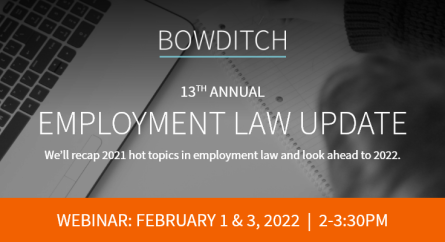Massachusetts Legislature Passes Long-Awaited Non-Compete Law
While there was much speculation that a bill regulating non-competition agreements would not pass by the end of this legislative session, in the final hours of the session, the legislature passed a bill restricting non-competition agreements by employers, which is expected to be signed by Governor Baker.
NON-COMPETE DEFINED
In the law, a non-competition agreement is defined as “an agreement between an employer and an employee, or otherwise arising out of an existing or anticipated employment relationship, under which the employee or expected employee agrees that the employee will not engage in certain specified activities competitive with the employee’s employer after the employment relationship has ended.”
NON-COMPETE EXEMPTIONS
In defining a non-competition agreement, the law exempts the following covenants and agreements, which will not fall under the purview of the new law:
- a covenant not to solicit or hire employees of the employer,
- a covenant not to solicit or transact business with customers, clients or vendors of the employer,
- an agreement made in connection with the sale of a business entity,
- an agreement outside of the employment relationship,
- a forfeiture agreement,
- a nondisclosure or confidentiality agreement,
- an invention assignment agreement,
- a garden leave clause,
- an agreement made in connection with the cessation of or separation from employment if the employee is expressly given 7 business days to rescind acceptance, or
- an agreement by which an employee agrees not to reapply for employment to the same employer after the employee’s termination.
MANDATED GARDEN LEAVE CLAUSE
A garden leave clause provides that the employer agrees to pay the employee during the time period he is restricted from competing with his former employer. In the new law, non-competition agreements must include a garden leave clause, which provides pay for the employee during the entire restricted period of at least 50% of the employee’s highest base salary over the prior two years, or other mutually-agreed upon consideration.
Importantly, the law does not define the “other mutually-agreed upon consideration” that may be agreed to by the employer and the employee, and therefore provides employers with flexibility not to include the garden leave pay as defined in the law, and instead agree to a different amount.
AGREEMENTS MADE AT THE COMMENCEMENT OF EMPLOYMENT
If an agreement is made at the commencement of employment, the agreement:
- must be in writing and signed by both the employer and the employee
- must expressly state that the employee has the right to consult with counsel prior to signing, and
- must be provided to the employee before a formal offer of employment is made or 10 business days before the commencement of the employee’s employment, whichever comes first.
AGREEMENTS MADE AFTER EMPLOYMENT HAS COMMENCED
If an agreement is entered into after the employment relationship has started, but not in connection with the employee’s separation from employment, in order to be enforceable, the agreement:
- must be supported by fair and reasonable consideration independent of the continuation of employment,
- must provide notice at least 10 days prior the effective date of the agreement,
- must be in writing,
- must be signed by both the employer and the employee, and
- must state that the employee has the right to consult with counsel prior to signing.
The law is not clear on what other fair and reasonable consideration is needed for a valid agreement; however, as garden leave provisions must be included in all non-competition agreements, this would suggest that additional consideration beyond a garden leave provision is required if the agreement is entered into after employment commences.
OTHER AGREEMENT REQUIREMENTS
Narrow in Scope: The law also requires that the agreement be “no broader than necessary to protect the legitimate business interests of the employer.” These business interests are further defined as either the employer’s trade secrets, confidential information, or goodwill.
Restriction Time Limitation: The stated restriction period within the agreement cannot exceed one year from the date of the end of employment; however, if the employee has breached his fiduciary duty to the employer, or the employee has unlawfully taken, either physically or electronically, property belonging to the employer, the restricted period may not be more than two years from the end of employment.
Narrow in Geographical Scope: The agreement must be reasonable in geographic scope. This provision will be presumed reasonable if it is limited to only the geographic areas in which the employee, during the last two years of employment, provided services or had “a material presence or influence.”
Narrow in Scope of Activities Limited: The agreement must be reasonable in the scope of proscribed activities it restricts. This provision will be presumed reasonable if the restriction “protects a legitimate business interest and is limited to only the specific types of services provided by the employee during the last two years of employment.”
EMPLOYEES INCLUDED AND EXCLUDED
The law includes independent contractors in the definition of “employee.” Further, noncompetition agreements are unenforceable against the following categories of employees:
- employees who are classified as non-exempt under the Fair Labor Standards Act,
- undergraduate or graduate students engaged in short-term employment,
- employees terminated without cause or laid off, or
- employees 18 years or younger.
REMEDIES AND APPROPRIATE VENUE
The law allows a court to toss the entire agreement out as null and void, and also to reform or revise a non-competition agreement, so as to render it a valid agreement to protect the employer’s legitimate business interests. Should a court deem a provision null and void, the remainder of the contract can remain valid.
The law further provides that if the parties agree to bring the action in Suffolk County, the superior court shall have exclusive jurisdiction over the action. No such jurisdictional limitation is noted if a case is filed in a county other than Suffolk County.
EFFECTIVE DATE
The new law goes into effect on October 1, 2018, and would only apply to agreements entered into, on or after that date.
Employers should review their current non-competition agreements to ensure that they are reasonable both in time and space, and that they are in place to protect legitimate business interests. Additionally, they should ensure that their new agreements are compliant with the new law. Finally, as there is much in the new law that is open to interpretation, expect litigation to follow to interpret, and potentially expand on, some of the undefined provisions of the law.
Categorized: Employees, Employment
Tagged In: employees, employers, employment, garden leave, Massachusetts, non-compete, non-competition agreements, nondisclosure agreements











